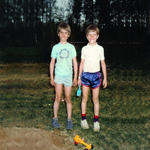|
|
 |
Dusted Reviews
Artist: Es Album: Kesämaan lapset Label: Fonal Review date: Aug. 25, 2009 |

|
|
|
 |
Summer in Finland is short, a memory before it even gets started. This future nostalgia – of being sad before the happy times even get going – has been the root of Sami Sänpäkkilä’s multiple artistic activities over the past decade or so. The catalogue of his record label, Fonal, bursts with equal parts overextended youthful enthusiasm and wry melancholia (not to mention the painfully hopeful titles of its two compilations, Surrounded by Sun and Summer and Smiles of Finland). As a filmmaker, Sänpäkkilä has a predilection for the hazy grain of Super 8 film stock, itself now almost a stand-in for the half-remembered past. In his solo guise as Es, his five albums have developed this same contradiction of memory and hope, weaving a grandiose melancholy usually using no more than cheap synths, piano, guitars, delay pedals, field recordings and chorus-like vocal arrangements.
Kesämaan lapset (loosely translated, “The Children of Summerland”) is in many ways Sänpäkkilä’s most backward-looking album. Just as the photos of youthful Sänpäkkilä playing in the countryside and hamming it up with friends explicitly look back to a classic vision of the happy childhood, the music reflects – almost longingly – on Sänpäkkilä’s music to date. The buoyant, criss-crossing minimalist psychedelia of Sateenkaarisuudelma turns up, in muted form on the brief “Kesä ja hymyilevät huulet,” and unmoored, like on the day-glo synth-bleep cluster of “Ennen oli huonommin.”
As interesting as these pieces are, though, it’s hard to say that with them Sänpäkkilä has performed that essential trick of memory – transforming the past so that it tells us something new. Elsewhere, he retreads his ideas, but takes the wrong path. “Haamut sun sydämestä,” a drone-melody piece that plays like synth-driven version of Sigur Ros, has Es’ trademark dramatic melancholy, but it crosses the border between grand and overblown that Sänpäkkilä has up to this point managed to avoid crossing.
Kesämaan lapset succeeds best on its 20-minute title track, when Sänpäkkilä lines up contrasting passages one after the other, building a surreal idyllic bliss that’s like an aural analogue of Andrei Tarkovsky’s masterpiece memory trip, The Mirror. It’s the same hypnotizing expanse Sänpäkkilä opened up on Kaikkeuden kauneus ja käsittämättömyys , but magnified – there are church organs, a passage scored for brass, wavering vocal chorale, field recordings of waves breaking and lapping the shore, even a blissed-out coda of sunny synths. It’s excessive, but in a way that transports us someplace new, not some place we already know.
For a record so focused on youth, Kesämaan lapset sounds pretty tired. It’s weighed down by the past – by Sänpäkkilä’s own accomplishments on the one hand, and on the other, by the very grown-up recognition that one can never get back to those moments when summer, or at least the idea of it, stretched on forever. What we hear the most is not someone struggling to move forward, but someone obsessed with the very natural and very grown-up desire to linger with those lost moments, if only for a little bit longer.
By Matthew Wuethrich
|







